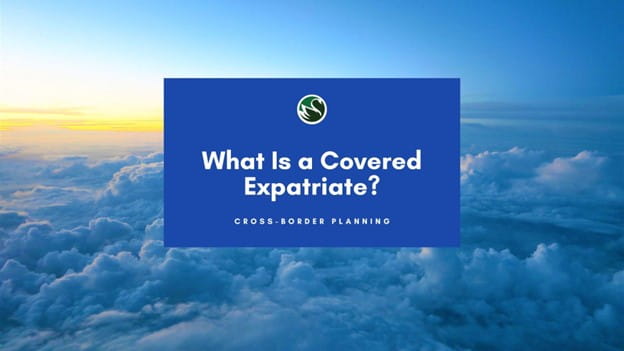What Is a Covered Expatriate?
Written by Tiffany Woodfield, TEP, Associate Portfolio Manager, CRPC®, CIM® and John Woodfield Portfolio Manager, CFP®, CIM®

Are You a Covered Expatriate?
If you’ve renounced your U.S. citizenship or given up your green card, you might be a covered expatriate.
A covered expatriate is a person who meets specific financial and legal criteria set by the IRS. It’s not just about leaving the U.S. but also about your net worth and whether you've been compliant with U.S. tax laws.
Covered expatriates face unique rules, including a potential exit tax. If this applies to you, understanding your status is essential. It can affect your finances, estate planning, and even your heirs. Let’s explore what this means and how it could impact you.
This blog is general in nature and you need to speak to a cross-border tax lawyer and cross-border financial advisor about your particular situation.
TABLE OF CONTENTS
- Are You a Covered Expatriate?
- Tests for Covered Expatriate Status
- Exceptions to Covered Expatriate Status
- Tax Implications for Covered Expatriates
- Specified Tax-Deferred Accounts
- Eligible and Ineligible Deferred Compensation
- Beneficial Interests in Non-grantor Trusts
- Pre-Expatriation Planning
- Common Questions
Tests for Covered Expatriate Status
Three main tests determine if you are a covered expatriate.
The first covered expatriate test is the net worth test. If your net worth is over $2 million on the day you expatriate, you could be considered a covered expatriate.
The second test is the tax liability test. If your "average annual net income tax liability for the five tax years ending before the date of expatriation is more than $201,000" (1), you might be a covered expatriate.
Finally, there’s the compliance test. If you fail to certify that you’ve met U.S. tax obligations for the past five years, the IRS may consider you a covered expatriate.
Each test requires careful review, as the consequences of meeting one can be significant. Speak to your cross-border advisor and cross-border accountant about whether or not you're a covered expatriate and what to do to minimize tax.
For more detailed information, see Form 8854 from the IRS and review the latest instructions on how to file.

Exceptions to Covered Expatriate Status
Not everyone who renounces citizenship is a covered expatriate.
The IRS provides exceptions for certain individuals. Also, remember if you aren’t giving up your U.S citizenship when you leave the country then you are not expatriating so this likely doesn’t apply to you.
Other examples are, if you were born a dual citizen and remain a citizen of another country, you might be excluded. Another exception is for minors who gave up citizenship before turning 18 ½, as long as they met other conditions, which include completing the renunciation before reaching 18 years and 6 months of age.
These exceptions can offer relief from the exit tax and related rules. However, navigating these nuances requires a detailed understanding of U.S. tax law and, often, professional advice.
Tax Implications for Covered Expatriates
Covered expatriates may owe an "exit tax" when they leave.
This tax is applied as if you sold all your worldwide assets the day before expatriating. Gains over $866,000 (2024) may be taxable, even if you haven’t sold anything. Additionally, gifts or bequests to U.S. persons from a covered expatriate can trigger taxes for the recipient. The rules are complex and can have lasting impacts on your wealth and legacy.
Working with a cross-border financial advisor, accountant and lawyer can help minimize surprises and protect your financial future.
In addition, the exit tax rates are subject to change. Make sure you find the most up-to-date numbers when doing your tax planning.

Specified Tax-Deferred Accounts
Certain tax-deferred accounts are treated differently for covered expatriates.
These include accounts like IRAs, 401(k)s, and similar retirement plans. Upon expatriation, these accounts are usually taxed as if you withdrew the entire balance the day before you expatriated. This is called a deemed distribution.
The IRS treats these deemed distributions as taxable income, even if no actual money changes hands. This can lead to significant tax liabilities, particularly if your accounts hold substantial balances.
Understanding how your tax-deferred accounts are handled is critical for planning and avoiding unexpected costs.
If you want to avoid a substantial tax hit, you should start working with a cross-border financial advisor at least six months before you move.
Eligible and Ineligible Deferred Compensation
Deferred compensation is taxed based on its classification as eligible or ineligible.
Eligible deferred compensation includes employer retirement plans that comply with U.S. tax rules, such as 401(k)s or pensions. For these, tax is generally deferred until you receive payments, subject to a 30% withholding tax.
Ineligible deferred compensation includes non-U.S. plans or non-compliant arrangements. These are taxed as if you received the full value before expatriating. The difference in tax treatment makes classifying your compensation correctly essential. This can be a complex process, often requiring professional assistance to ensure accuracy and compliance.
You should be working with a cross-border financial advisor before you move to ensure you have a plan in place to manage your finances and offer solutions of when to bring in other professionals.
Beneficial Interests in Non-grantor Trusts
If you have an interest in a non-grantor trust, it may be subject to special rules.
We have met cross-border individuals who have fallen into tax traps with non-grantor trusts. You should speak to a cross-border tax lawyer if you have an interest in a non-grantor trust because the rules are complex.
First, a grantor trust is a trust where the person who set up the trust is considered the owner of the trust assets for tax purposes and they usually have control over the trust. A non-grantor trust is where the grantor has no control over the trust, and the trust is usually set up to provide estate tax reduction and asset protection.
Income from a non-grantor trust is generally taxed upon distribution to the beneficiary.
If you are a covered expatriate and beneficiary of a non-grantor trust and there is a distribution of property to you before your expatriation date, then the trustee must withhold 30% of the taxable portion of the distribution. If you are considered the owner of a foreign non-grantor trust then the assets attributed to you as a covered expatriate are subject to the mark-to-market regime.
Without careful planning, these rules can lead to unexpected taxes for you and your heirs.
Seek the guidance of a cross-border advisor with estate planning expertise and a cross-border tax lawyer if you have trusts in the U.S. and are planning on moving to Canada.
Pre-Expatriation Planning
Proper planning before expatriation can save you money and stress. Proper planning involves reviewing your net worth, tax liabilities, and compliance history. This may include:
- Review your net worth, tax liabilities, and compliance history.
- Consider strategies like reducing your assets below $2 million, settling unpaid taxes, or restructuring investments.
- Consult with cross-border financial and tax advisors to ensure compliance with U.S. and foreign laws.
- Focus on minimizing exit tax exposure and preparing for potential tax implications.
- Remember, pre-expatriation planning secures your financial future and helps you avoid surprises.
Exit Tax Tips for Americans
Common Questions
What are the federal tax obligations of a covered expatriate in the U.S.?Covered expatriates may face an "exit tax" on worldwide assets. They are also responsible for reporting and potentially paying tax on certain types of income, including deemed distributions from tax-deferred accounts and ineligible deferred compensation.
What is the "average income tax liability?"This refers to the average annual U.S. income tax liability over the past five years. For 2023, if it exceeds $190,000, the individual may meet the criteria for covered expatriate status. (2)
What is the definition of a long-term resident?A long-term resident is a non-U.S. citizen who has held a green card for at least eight of the past 15 years. This designation plays a role in determining expatriation tax obligations. This is a general guideline and you should speak to an immigration lawyer to determine whether you may be a long-term resident.
What is a non-covered expatriate?A non-covered expatriate is someone who does not meet the criteria for covered expatriate status, such as the net worth, tax liability, or compliance tests set by the IRS. Review the paragraphs above on what makes you a covered expatriate.
What is a long-term resident?A long-term resident is a non-citizen of the U.S. who has had lawful permanent resident status (Green Card) for a significant period. For tax purposes, this typically means eight of the last 15 years.
What are covered expatriate exceptions?Exceptions may include individuals who were born dual citizens and meet specific criteria or minors who expatriated before age 18 ½. These exceptions can help avoid the exit tax and related obligations.
Final Thoughts
Understanding the concept of a covered expatriate is essential for anyone renouncing U.S. citizenship or giving up a green card.
Covered expatriate status is determined by tests for net worth, tax liability, and compliance with U.S. tax laws. This status can trigger an exit tax, affect tax-deferred accounts, and create implications for trusts and deferred compensation. While exceptions exist for certain individuals, most covered expatriates face complex financial and tax challenges.
The key to minimizing risks and protecting your wealth lies in careful pre-expatriation planning. By working with cross-border financial advisors and tax lawyers, you can navigate these complexities with confidence and clarity.
Next Steps
If you’re a Canadian resident or are planning on moving to Canada or the US and need assistance with moving and optimizing your investments, estate planning, wealth management and portfolio management, please get in touch. At SWAN Wealth, we specialize in Canadian financial planning, cross-border financial planning and cross-border wealth management.
Read More
If you’re planning a cross-border move, these articles and guides will help simplify your move and ensure everything is covered.
- Services for Americans Moving to Canada
- Moving to Canada from the US
- Cross-Border Estate Planning Guide
About the Authors
Tiffany Woodfield is an Associate Portfolio Manager licensed in Canada and the USA, a Chartered Investment Manager (CIM), a Chartered Retirement Planning Counselor (CRPC), a Trust and Estate Practitioner (TEP) and the co-founder of SWAN Wealth Management, along with her husband, John Woodfield. Tiffany advises clients who live in Canada and the United States and want to simplify their cross-border financial plan, move their assets across the border, and optimize their investments to minimize their tax burden. Together, Tiffany and John Woodfield help their clients simplify their cross-border finances and create long-term revenue streams that will keep their assets safe whether they live in Canada or the U.S.
John Woodfield is a Financial Management Advisor (FMA), a Chartered Investment Manager (CIM), and a Certified Financial Planner (CFP), and in 2007 was inducted as a fellow of the Canadian Securities Institute (FCSI). As a portfolio manager and CFP®, he works with clients across Canada. John Woodfield’s clients are families, individuals and business owners who understand the importance of comprehensive wealth and investment plans driven by the lifestyle they want to lead.
Schedule a Call
Schedule a 15-minute introductory call with SWAN Wealth Management.
Click here to schedule a call.
Resources
Instructions for Form 8854 (2024)
www.irs.gov/instructions/i8854
Expatriation Tax for International Tax Payers
www.irs.gov/individuals/international-taxpayers/expatriation-tax





